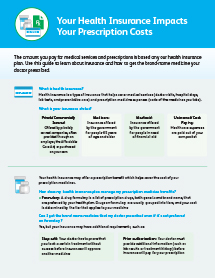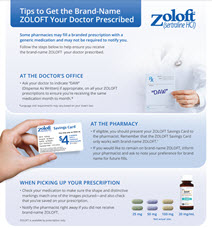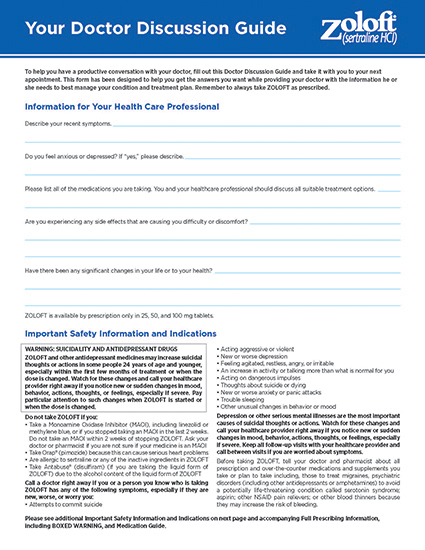What is the most important information I should know about ZOLOFT?
ZOLOFT may cause serious side effects. Call your healthcare provider right away if you have any of the following symptoms, or call 911 if there is an emergency.
- Suicidal thoughts or actions:
- ZOLOFT and other antidepressant medicines may increase suicidal thoughts or actions in some people 24 years of age and younger, especially within the first few months of treatment or when the dose is changed.
- Depression or other serious mental illnesses are the most important causes of suicidal thoughts or actions.
- Watch for these changes and call your healthcare provider right away if you notice new or sudden changes in mood, behavior, actions, thoughts, or feelings, especially if severe.
- Pay particular attention to such changes when ZOLOFT is started or when the dose is changed.
- Keep all follow-up visits with your healthcare provider and call between visits if you are worried about symptoms.
- Call a doctor right away if you or a person you know who is taking ZOLOFT has any of the following symptoms, especially if they are new, worse, or worry you:
- thoughts about suicide or dying
- attempts to commit suicide
- new or worse depression
- new or worse anxiety
- feeling very agitated or restless
- panic attacks
- trouble sleeping (insomnia)
- new or worse irritability
- acting aggressive, being angry, or violent
- acting on dangerous impulses
- an extreme increase in activity and talking (mania)
- other unusual changes in behavior or mood
- Serotonin Syndrome. This condition can be life-threatening and symptoms may include:
- agitation, hallucinations, coma, or other changes in mental status
- racing heartbeat, high or low blood pressure
- coordination problems or muscle twitching (overactive reflexes)
- nausea, vomiting, or diarrhea
- sweating or fever
- muscle rigidity
- Increased chance of bleeding: ZOLOFT and other antidepressant medicines may increase your risk of bleeding or bruising, especially if you take the blood thinner warfarin (COUMADIN®, JANTOVEN®), a non-steroidal anti-inflammatory drug (NSAIDs, like ibuprofen or naproxen), or aspirin.
- Manic episodes. Symptoms may include:
- greatly increased energy
- racing thoughts
- unusually grand ideas
- severe trouble sleeping
- reckless behavior
- excessive happiness or irritability
- talking more or faster than usual
- Seizures or convulsions.
- Glaucoma (angle-closure glaucoma). ZOLOFT may cause a certain type of eye problem called angle-closure glaucoma. Call your healthcare provider if you have eye pain, changes in your vision, or swelling or redness in or around the eye. Only some people are at risk for these problems. You may want to undergo an eye examination to see if you are at risk and receive preventative treatment if you are.
- Changes in appetite or weight.
- Low salt (sodium) levels in the blood. Elderly people may be at greater risk for this. Symptoms may include headache, weakness or feeling unsteady, confusion, problems concentrating or thinking, or memory problems.
- Sexual problems (dysfunction). Taking selective serotonin reuptake inhibitors (SSRIs), including ZOLOFT, may cause sexual problems.
|
|
|
|
|
|
Do not take ZOLOFT if you:
- take a monoamine oxidase inhibitor (MAOI). Ask your healthcare provider or pharmacist if you are not sure if you take an MAOI, including the antibiotic linezolid.
- have taken an MAOI within 2 weeks of stopping ZOLOFT unless directed to do so by your healthcare provider.
- have stopped taking an MAOI in the last 2 weeks unless directed to do so by your healthcare provider.
- take any other medicines that contain sertraline (such as sertraline HCl or sertraline hydrochloride).
- take the antipsychotic medicine pimozide (ORAP®) because this can cause serious heart problems.
- are allergic to sertraline or any of the ingredients in ZOLOFT.
- take ANTABUSE® (disulfiram) (if you are taking the liquid form of ZOLOFT) due to the alcohol content.
Before taking ZOLOFT, tell your healthcare provider about all your medical conditions and all the medicines you take, including prescription and over-the-counter medicines, vitamins, and herbal supplements. ZOLOFT and other medicines may affect each other causing possible serious side effects. ZOLOFT may affect the way other medicines work, and other medicines may affect the way ZOLOFT works.
Before taking ZOLOFT, tell your healthcare provider if you are pregnant or plan to become pregnant; breastfeeding or plan to breastfeed.
Do not start or stop any other medicines during treatment with ZOLOFT without first talking to your healthcare provider.
ZOLOFT can cause sleepiness or may affect your ability to make decisions, think clearly, or react quickly. You should not drive, operate heavy machinery, or do other dangerous activities until you know how ZOLOFT affects you.
Do not drink alcohol while you take ZOLOFT.
The most common side effects in adults treated with ZOLOFT include:
- nausea, loss of appetite, diarrhea, or indigestion
- increased sweating
- tremor or shaking
- agitation
- change in sleep habits, including increased sleepiness or insomnia
- sexual problems, including decreased libido and ejaculation failure
- feeling tired or fatigued
- anxiety
In children and adolescents treated with ZOLOFT, adverse reactions were generally similar to those seen in adults with the following additional side effects: abnormal increase in muscle movement or agitation, nose bleeds, urinary incontinence, aggressive reaction, possible slowed growth rate, and weight change.
Indications
ZOLOFT is a prescription medication for the treatment, in adults, of Major Depressive Disorder (MDD), Obsessive-Compulsive Disorder (OCD), Panic Disorder, Posttraumatic Stress Disorder (PTSD), Premenstrual Dysphoric Disorder (PMDD), and Social Anxiety Disorder. It is also approved to treat Obsessive Compulsive Disorder (OCD) in children and adolescents aged 6-17 years.
Product names referenced herein are trademarks of their respective owners.
Please see Full Prescribing Information, including Boxed WARNING and Medication Guide.





